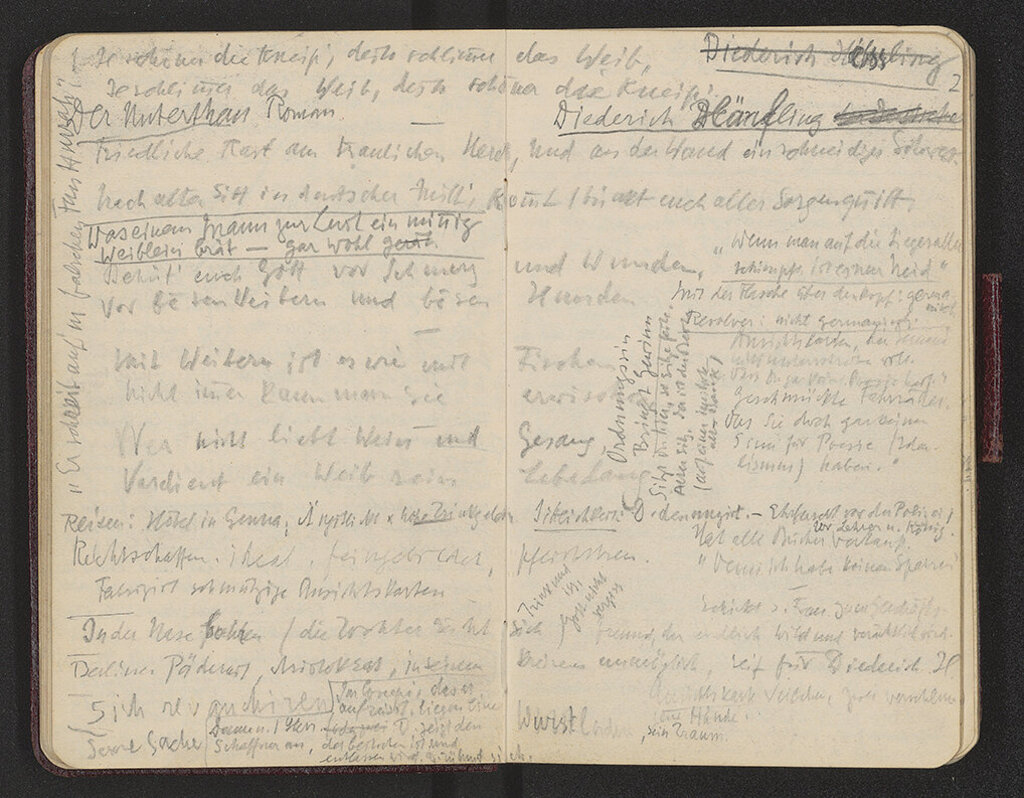
Heinrich Mann. Notebooks and diaries, memo calendar
Heinrich Mann (1871–1950) was one of the most important German-language writers of the 20th century. He influenced literature and society of his time through his novels, stories and essays. In addition to manuscripts, correspondence and personal documents, the Heinrich Mann Archive of the Akademie der Künste also includes a memo calendar, two diaries and seven notebooks that provide information on the author's living situation and his social contacts as well as poetic drafts and travel notes. They provide important indications as to the sources for and intellectual backgrounds to Heinrich Mann's works and are indispensable for understanding them. The notebooks also show an alert contemporary who observed the political situation and constantly took a critical stance.
born on 27/03/1871 in Lübeck – died on 11/03/1950 in Santa Monica (USA)
Heinrich Mann came from a Lübeck patrician family. He attended the Katharineum grammar school and, after finishing school, began an apprenticeship as a bookseller in Dresden. From 1890 to 1892, he completed a traineeship at the S. Fischer Verlag Berlin publishing house and was a guest student at the university at the same time. He then lived as a freelance writer in Munich and Italy. From 1914, he returned to Munich permanently and started a family. After divorcing his first wife, Maria Kanová, he moved to Berlin in 1928. In 1926, Heinrich Mann became a member of the Prussian Academy of Arts and was the first chairperson of the poetry section from 1931 to 1933. In 1933, he was forced to leave the Academy and had to flee the country. In May 1933, his German citizenship was revoked by the National Socialist state. Initially stateless, he was granted Czechoslovakian citizenship in 1936. His exile took him to France in 1933 and then to the USA in 1940, where he lived in California. In 1949, he was elected president of the German Academy of Arts, (East Berlin) but passed away on 11 March 1950 in Santa Monica before he could return to Germany and take up office. Mann's most important works include the novels Die kleine Stadt (1909), Der Untertan (1918) and the memoir Ein Zeitalter wird besichtigt (1946). He became world famous through the film adaptation of his novel Professor Unrat (1930, under the title The Blue Angel). Heinrich Mann was one of the greatest writers of his time. His oeuvre is defined by socially critical commitment and includes some of the most enduring works of German literature of the 20th century.
Archive and collection
The Heinrich Mann holdings include numerous manuscripts from all of his creative periods: his first attempts at writing, especially lyrical works (1885-1891), dramas, novels, stories and outlines (1885-1925) as well as novel manuscripts and the corresponding drafts and notes. The works are supplemented by diary entries, notebooks and a memo calendar. The archive also includes extensive correspondence with family members, fellow writers, publishers, editors and theatres, personal and family history documents and photographs.
History of the holdings
The Akademie der Künste holds most of the literary estate and the estate library, which were acquired in several stages between 1951 and 1961 from his daughter Leonie Mann-Aškenazy. On the one hand, it includes documents that Heinrich Mann left after divorcing his first wife in 1928 dating back to his early creative period, and on the other hand the materials created in France and the USA. The archive is completed by the Heinrich Mann Collection, comprising acquisitions of various provenances including purchases from the auction and antiquarian markets.
